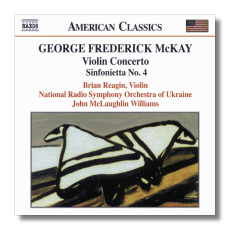
The Internet's Premier Classical Music Source
Related Links
- Latest Reviews
- More Reviews
-
By Composer
-
Collections
DVD & Blu-ray
Books
Concert Reviews
Articles/Interviews
Software
Audio
Search Amazon
Recommended Links
Site News
 CD Review
CD Review
George Frederick McKay

- Concerto for Violin and Orchestra
- Suite on Sixteenth Century Hymn Tunes
- Sinfonietta #4
- Song Over the Great Plains
Brian Reagin, violin
Ludmilla Kovaleva, piano
National Radio Symphony of Ukraine/John McLaughlin Williams
Naxos 8.559225 DDD 78:18
Another fine release in Naxos' "American Classics" series, this disc is devoted to George Frederick McKay (1899-1970). Born in the state of Washington, he eventually returned there; he was a professor at the University of Washington in Seattle from 1927 until 1968. In the meantime, he received his education at the Eastman School of Music, earning the first degree in composition awarded by that institution. His teachers included Christian "Rustle of Spring" Sinding. His pupils include William Bolcom and John Cage.
The Violin Concerto (1940) is an imposing work, stylistically not far removed from Barber's work in this genre, although with a good dash of Sibelius' concerto, too. (Some might say that Barber plus Sibelius equals Howard Hanson, and in this case they wouldn't be too far from the mark.) McKay entered the concerto the following year in a competition established by Jascha Heifetz. It received only an honorable mention among the works submitted, although it appears that Heifetz singled the concerto out for praise. The work is in three connected movements. McKay's concerto, romantic yet unmistakably modern and American, is a fine example of how tonality had hardly been squeezed dry in the years leading up to World War Two.
Louis Bourgeois was a 16th-century French Calvinist. He was sent to Switzerland to create new adaptations of hymns in the Geneva Psalter. The five selections in McKay's Suite on Sixteenth Century Hymn Tunes are adapted from Bourgeois's work. Originally written for organ in 1945, McKay transcribed it for two string orchestras in 1962. (A celesta is added in the fourth movement.) The music, which retains the charming antiquity of the source material, is dignified and moving. Nevertheless, the richness of McKay's string arrangements recalls even Vaughan Williams' Fantasia on a Theme of Thomas Tallis.
In the Sinfonietta #4 (1942), McKay moves away from the lushness of the Violin Concerto. The first movement is busy and jagged-edged. The middle movement (marked "Moderato pastorale") has the feel of a nature piece, or of a sort of Native American blues. The finale regains the bustling character of the opening movement, but is much more cheerful.
Based on the song of a meadowlark he had heard in the Dakotas, McKay wrote Song Over the Great Plains (1953) to be another nature piece. A solo piano represents the meadowlark's call, and the orchestra "paints" the lonely beauty of the Great Plains to telling effect. Next to McKay's work, Ferde Grofé's Grand Canyon Suite sounds very naïve.
The Ukrainian orchestra plays McKay's music as if they were a bunch of Westerners to the manner born. The conductor (not to be confused with John Williams the guitarist or John Williams the film composer and former conductor of the Boston Pops) has made several fine recordings, of which this is only the most recent. The engineers have captured it all in resplendent sound. Don't hesitate – this is lovely and memorable.
Copyright © 2005, Raymond Tuttle



















